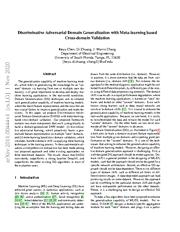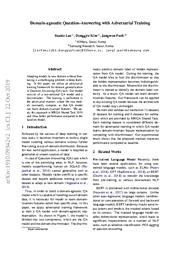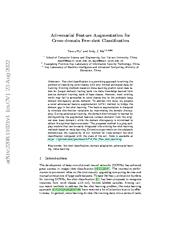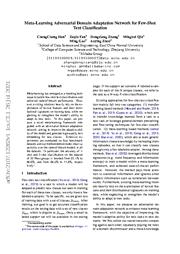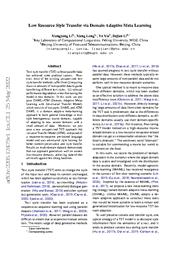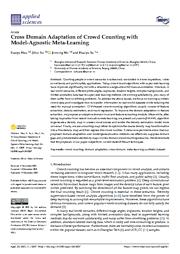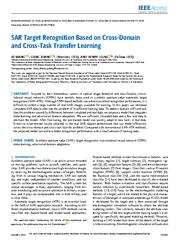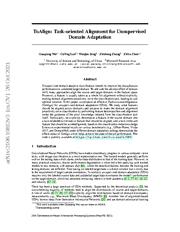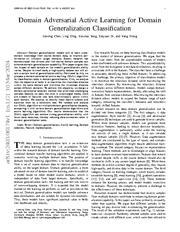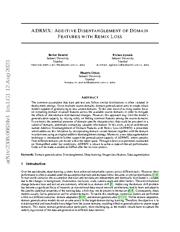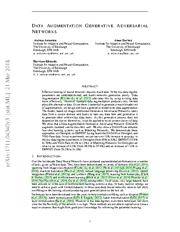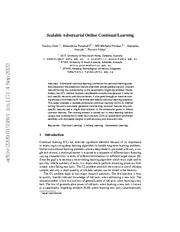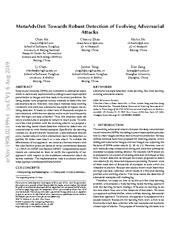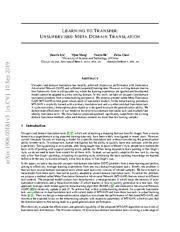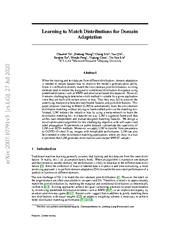A copy of this work was available on the public web and has been preserved in the Wayback Machine. The capture dates from 2020; you can also visit the original URL.
The file type is application/pdf.
Filters
Discriminative Adversarial Domain Generalization with Meta-learning based Cross-domain Validation
[article]
2020
arXiv
pre-print
In this paper, we propose Discriminative Adversarial Domain Generalization (DADG) with meta-learning-based cross-domain validation. ...
representation on multiple "seen" domains, and (ii) meta-learning based cross-domain validation, which simulates train/test domain shift via applying meta-learning techniques in the training process. ...
Our DADG contains two main components, discriminative adversarial learning (DAL) and meta-learning based cross domain validation (Meta-CDV). ...
arXiv:2011.00444v1
fatcat:odyqjjadrbdwvd46qbel4itoxa
Domain-agnostic Question-Answering with Adversarial Training
[article]
2019
arXiv
pre-print
In this paper, we utilize an adversarial training framework for domain generalization in Question Answering (QA) task. Our model consists of a conventional QA model and a discriminator. ...
The training is performed in the adversarial manner, where the two models constantly compete, so that QA model can learn domain-invariant features. ...
Recently, meta-learning has been proposed for domain generalization. ...
arXiv:1910.09342v2
fatcat:5khf7io3nfa5lcuyu2vk762iyu
Adversarial Feature Augmentation for Cross-domain Few-shot Classification
[article]
2022
arXiv
pre-print
Existing methods based on meta-learning predict novel-class labels for (target domain) testing tasks via meta knowledge learned from (source domain) training tasks of base classes. ...
During adversarial training, the domain discriminator is learned by distinguishing the augmented features (unseen domain) from the original ones (seen domain), while the domain discrepancy is minimized ...
While the adversarial-based method DANN [12] learns domain-variance features by adversarial progress between encoder and domain discriminators. ...
arXiv:2208.11021v1
fatcat:emhovt7ndngrpopjacphp7h5zq
Meta-Learning Adversarial Domain Adaptation Network for Few-Shot Text Classification
[article]
2021
arXiv
pre-print
In this paper, we propose a novel meta-learning framework integrated with an adversarial domain adaptation network, aiming to improve the adaptive ability of the model and generate high-quality text embedding ...
Meta-learning has emerged as a trending technique to tackle few-shot text classification and achieved state-of-the-art performance. ...
Our strategy is to combine the proposed domain adversarial network with meta-learning, generating more comprehensive transferable features. ...
arXiv:2107.12262v1
fatcat:ppuu3lgxgvcdbostoayyllr5ai
Low Resource Style Transfer via Domain Adaptive Meta Learning
[article]
2022
arXiv
pre-print
DAML is a domain adaptive meta-learning approach to learn general knowledge in multiple heterogeneous source domains, capable of adapting to new unseen domains with a small amount of data. ...
In this work, we propose DAML-ATM (Domain Adaptive Meta-Learning with Adversarial Transfer Model), which consists of two parts: DAML and ATM. ...
In the meta-validation phase, the base model is updated by gradient descent with respect to the parameters θ on D val . ...
arXiv:2205.12475v1
fatcat:sds77tnspfgnblq6dzj2udrseu
Cross Domain Adaptation of Crowd Counting with Model-Agnostic Meta-Learning
2021
Applied Sciences
Extensive experiments show that our proposed domain adaptation- and model-generalization methods can effectively suppress domain gaps and produce elaborate density maps in cross-domain crowd-counting scenarios ...
Meanwhile, after taking inspiration from recent innovative meta-learning, we present a dynamic-β MAML algorithm to generate a density map in unseen novel scenes and render the density estimation model ...
Finally, the domain discriminator was trained, in adversarial mode, with a real-world dataset and GCC dataset. ...
doi:10.3390/app112412037
fatcat:l6lqcpggzbadrhfrhexkyzdlwa
SAR Target Recognition Based on Cross-Domain and Cross-Task Transfer Learning
2019
IEEE Access
INDEX TERMS Synthetic aperture radar (SAR), target recognition, convolutional neural network (CNN), meta-learning, adversarial domain adaptation. ...
To address domain shift and task transfer problems caused by differences between simulated and real data, we propose a model that integrates meta-learning and adversarial domain adaptation. ...
To solve cross-domain and cross-task transfer problems simultaneously, we propose a unified network that combines meta-learning with adversarial domain adaptation. ...
doi:10.1109/access.2019.2948618
fatcat:3mql7wr6nzgnfhxvhgvmdipium
ToAlign: Task-oriented Alignment for Unsupervised Domain Adaptation
[article]
2021
arXiv
pre-print
Particularly, we explicitly decompose a feature in the source domain into a task-related/discriminative feature that should be aligned, and a task-irrelevant feature that should be avoided/ignored, based ...
on the classifcation meta-knowledge. ...
For domain adversarial learning based approach (e.g., DANN [18, 19] ), in general, a domain discriminator is trained to distinguish the source domain from the target domain, meanwhile a feature extractor ...
arXiv:2106.10812v3
fatcat:nvctgeajmvgjxaaccyfa36jqha
Domain Adversarial Active Learning for Domain Generalization Classification
[article]
2024
arXiv
pre-print
We validate and analyze our DAAL algorithm on multiple domain generalization datasets, comparing it with various domain generalization algorithms and active learning algorithms. ...
Domain generalization models aim to learn cross-domain knowledge from source domain data, to improve performance on unknown target domains. ...
Meta-Learning for Domain Generalization (MLDG) [36] attempts to learn a general model by dividing multiple source domains into meta-train and meta-test sets to simulate domain shift. ...
arXiv:2403.06174v1
fatcat:bdcnq3ickrgczlkhjbjtm54h2m
ADRMX: Additive Disentanglement of Domain Features with Remix Loss
[article]
2023
arXiv
pre-print
Given multiple source domains, domain generalization aims to create robust models capable of generalizing to new unseen domains. ...
with the domain invariant ones using an original additive disentanglement strategy. ...
Meta Learning Domain generalization problem has also been studied in the context of meta learning frameworks [8, 24] . [8] introduced a model-agnostic training procedure to address domain shifts. ...
arXiv:2308.06624v1
fatcat:e7i5rjxdpncrncpmjzbx7u2aqi
Data Augmentation Generative Adversarial Networks
[article]
2018
arXiv
pre-print
The model, based on image conditional Generative Adversarial Networks, takes data from a source domain and learns to take any data item and generalise it to generate other within-class data items. ...
We show that a Data Augmentation Generative Adversarial Network (DAGAN) augments standard vanilla classifiers well. ...
For one-shot networks, DAGAN training was done on the source domain, and the meta learning done on the source domain, and validated on the validation domain. ...
arXiv:1711.04340v3
fatcat:woz7kgprrzbyblerqhnpkb2koi
Scalable Adversarial Online Continual Learning
[article]
2022
arXiv
pre-print
This paper proposes a scalable adversarial continual learning (SCALE) method putting forward a parameter generator transforming common features into task-specific features and a single discriminator in ...
Adversarial continual learning is effective for continual learning problems because of the presence of feature alignment process generating task-invariant features having low susceptibility to the catastrophic ...
The parameter generator is trained in the meta-learning way using the validation loss of the base network, i.e., feature extractor and classifier. ...
arXiv:2209.01558v1
fatcat:r2t4xctsdza3tpeoce5dk5z4we
To solve such few-shot problem with the evolving attack, we propose a meta-learning based robust detection method to detect new adversarial attacks with limited examples. ...
To validate the effectiveness of our approach, we construct the benchmarks with few-shot-fashion protocols based on three conventional datasets, i.e. CIFAR-10, MNIST and Fashion-MNIST. ...
CONCLUSION In this paper, we present a meta-learning based adversarial attack detection approach for detecting evolving adversary attacks with limited examples. ...
doi:10.1145/3343031.3350887
dblp:conf/mm/MaZSCYZ19
fatcat:yhiny62rg5bjjb7fwmbfegg2cq
Learning to Transfer: Unsupervised Meta Domain Translation
[article]
2019
arXiv
pre-print
Unsupervised domain translation has recently achieved impressive performance with Generative Adversarial Network (GAN) and sufficient (unpaired) training data. ...
In this work, we take on unsupervised domain translation problems from a meta-learning perspective. ...
Convergence Rate Our meta-learning based approach has demonstrated that, with several domain translation tasks, it can incorporate the prior learning experiences on these tasks and generalize to a new ...
arXiv:1906.00181v3
fatcat:ge4wp2oagbfqnpjkrdfd7vruny
Learning to Match Distributions for Domain Adaptation
[article]
2020
arXiv
pre-print
and adversarial-based discrepancies. ...
This paper proposes Learning to Match (L2M) to automatically learn the cross-domain distribution matching without relying on hand-crafted priors on the matching loss. ...
Generative adversarial nets (GANs) [34] matches distributions between training and generated samples by iteratively training a domain discriminator and generator to confuse the discriminator. ...
arXiv:2007.10791v3
fatcat:sezzhmdkzzhexbe5ulax5wxjzu
« Previous
Showing results 1 — 15 out of 5,239 results

